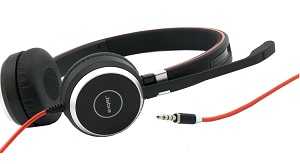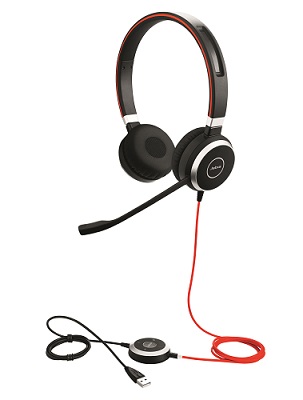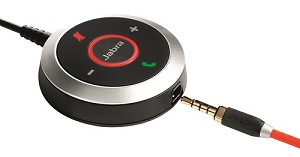There were 1 posts tagged: Professional Quality
USB headsets vs. 3.5mm headsets
Sound quality is crucial when making calls and streaming multimedia. We always want to use the best headset for each environment, connection type, and personal wearing preference. We assume that "all headsets are created equal," but that is not the case. Recently,  we heard the statement: "Jack connections work more reliably than USB ones" when used with PCs; in fact, USB headsets offer more benefits and better sound quality, as well as reliability. We recommend USB headsets over 3.5mm headsets when connecting to computers, and here's why:
we heard the statement: "Jack connections work more reliably than USB ones" when used with PCs; in fact, USB headsets offer more benefits and better sound quality, as well as reliability. We recommend USB headsets over 3.5mm headsets when connecting to computers, and here's why:
Jack connections, or 3.5mm connectors, are pin-shaped plugs that can support stereo sound and microphones, depending on the number of separate connector rings on the plug or jack. The 3.5mm jack has been a standard feature across numerous devices, especially portable ones, such as the transistor radio, Walkman, and most recently, different makes and models of smartphones. They can also be used with computers that have the 3.5mm jack plug. The 3.5mm uses the device's sound processing system, such as a computer's sound card, for analog sound.
 USB headsets bypass your computer's sound card and use their own sound processing system, for better sound quality than 3.5mm headsets. USB headsets benefit from digital-to-analog processing outside of the computer. USB processes digital sound from your device and runs it through its sound system that filters out the audio and removes ambient noise, resulting in much cleaner sounds. For rich wideband audio, and to hear more highs and lows, USB connection is typically preferred. USB provides a lifelike audio experience, compared with 3.5mm headsets.
USB headsets bypass your computer's sound card and use their own sound processing system, for better sound quality than 3.5mm headsets. USB headsets benefit from digital-to-analog processing outside of the computer. USB processes digital sound from your device and runs it through its sound system that filters out the audio and removes ambient noise, resulting in much cleaner sounds. For rich wideband audio, and to hear more highs and lows, USB connection is typically preferred. USB provides a lifelike audio experience, compared with 3.5mm headsets.
Another great feature found in USB headsets: in-line call controllers, for ease of call management. Buttons for answer/end, volume, and mute are standards for the control units.
USB headsets can be continually updated, thanks to the free firmware updates offered by each brand, such as Jabra Direct for all Jabra USB devices. And, with cloud-based software management programs that support all main operating systems (some free, others available at scaling costs), global inventory, mass deployments, call analytics, agile maintenance and more can be achieved at the click of a button from an IT administrator. Jabra Xpress is one of these global software management software packages.
The Jabra Evolve 40 headset pictured throughout this post offers both 3.5mm and USB connections. It is a versatile headset for both in the office, and on the go. We always recommend the use of the USB connection when using the Evolve 40 with a PC. The Jabra Eolve 40 is available in both standard USB and USB-C options.
Source: USB vs Analog Headsets, azcentral.
 we heard the statement: "Jack connections work more reliably than USB ones" when used with PCs; in fact, USB headsets offer more benefits and better sound quality, as well as reliability. We recommend USB headsets over 3.5mm headsets when connecting to computers, and here's why:
we heard the statement: "Jack connections work more reliably than USB ones" when used with PCs; in fact, USB headsets offer more benefits and better sound quality, as well as reliability. We recommend USB headsets over 3.5mm headsets when connecting to computers, and here's why:Jack connections, or 3.5mm connectors, are pin-shaped plugs that can support stereo sound and microphones, depending on the number of separate connector rings on the plug or jack. The 3.5mm jack has been a standard feature across numerous devices, especially portable ones, such as the transistor radio, Walkman, and most recently, different makes and models of smartphones. They can also be used with computers that have the 3.5mm jack plug. The 3.5mm uses the device's sound processing system, such as a computer's sound card, for analog sound.
 USB headsets bypass your computer's sound card and use their own sound processing system, for better sound quality than 3.5mm headsets. USB headsets benefit from digital-to-analog processing outside of the computer. USB processes digital sound from your device and runs it through its sound system that filters out the audio and removes ambient noise, resulting in much cleaner sounds. For rich wideband audio, and to hear more highs and lows, USB connection is typically preferred. USB provides a lifelike audio experience, compared with 3.5mm headsets.
USB headsets bypass your computer's sound card and use their own sound processing system, for better sound quality than 3.5mm headsets. USB headsets benefit from digital-to-analog processing outside of the computer. USB processes digital sound from your device and runs it through its sound system that filters out the audio and removes ambient noise, resulting in much cleaner sounds. For rich wideband audio, and to hear more highs and lows, USB connection is typically preferred. USB provides a lifelike audio experience, compared with 3.5mm headsets.
Another great feature found in USB headsets: in-line call controllers, for ease of call management. Buttons for answer/end, volume, and mute are standards for the control units.
USB headsets can be continually updated, thanks to the free firmware updates offered by each brand, such as Jabra Direct for all Jabra USB devices. And, with cloud-based software management programs that support all main operating systems (some free, others available at scaling costs), global inventory, mass deployments, call analytics, agile maintenance and more can be achieved at the click of a button from an IT administrator. Jabra Xpress is one of these global software management software packages.

The Jabra Evolve 40 headset pictured throughout this post offers both 3.5mm and USB connections. It is a versatile headset for both in the office, and on the go. We always recommend the use of the USB connection when using the Evolve 40 with a PC. The Jabra Eolve 40 is available in both standard USB and USB-C options.
Our Headset Experts are ready to help you find the best headset for your environment. Give us a call at 1-866-998-9991 or Chat us now!
Source: USB vs Analog Headsets, azcentral.

